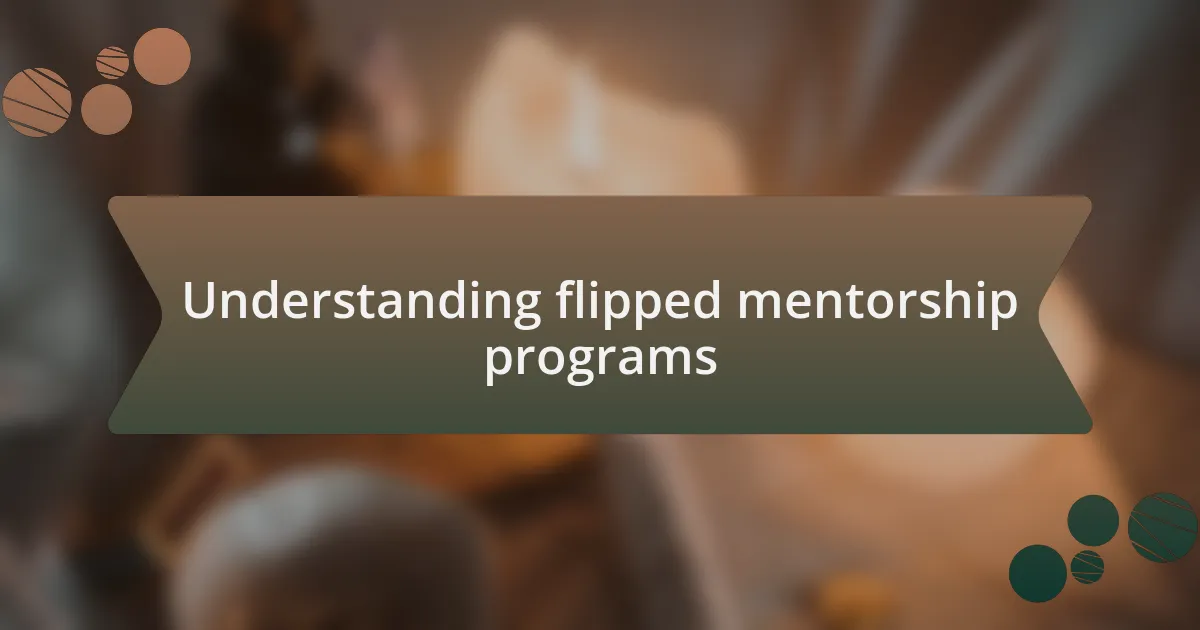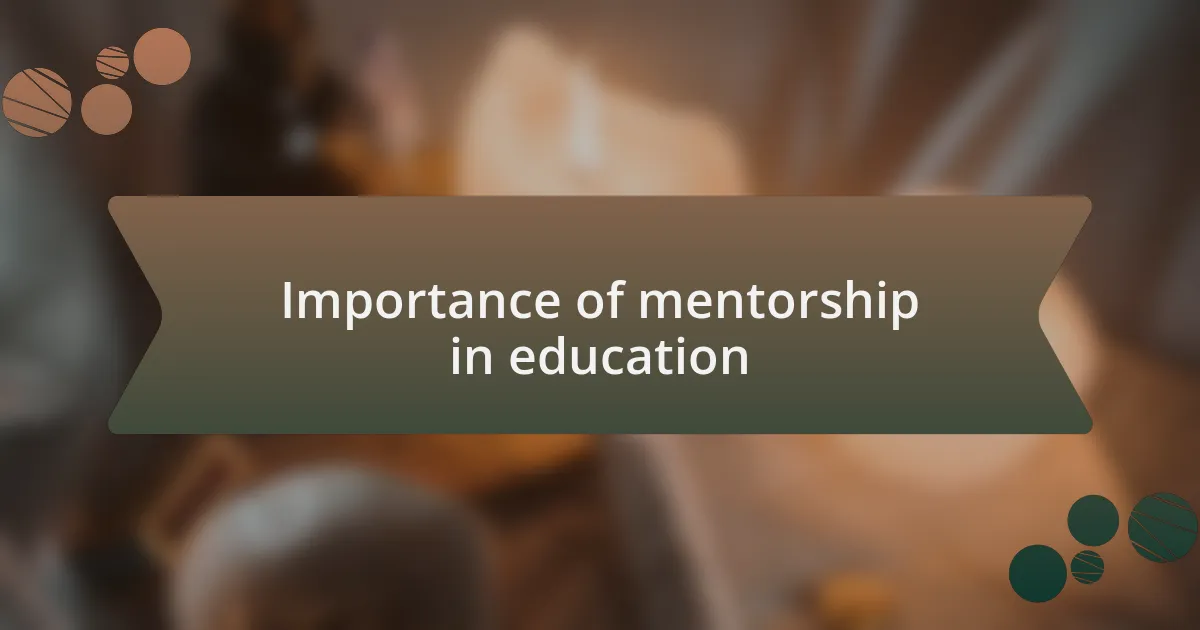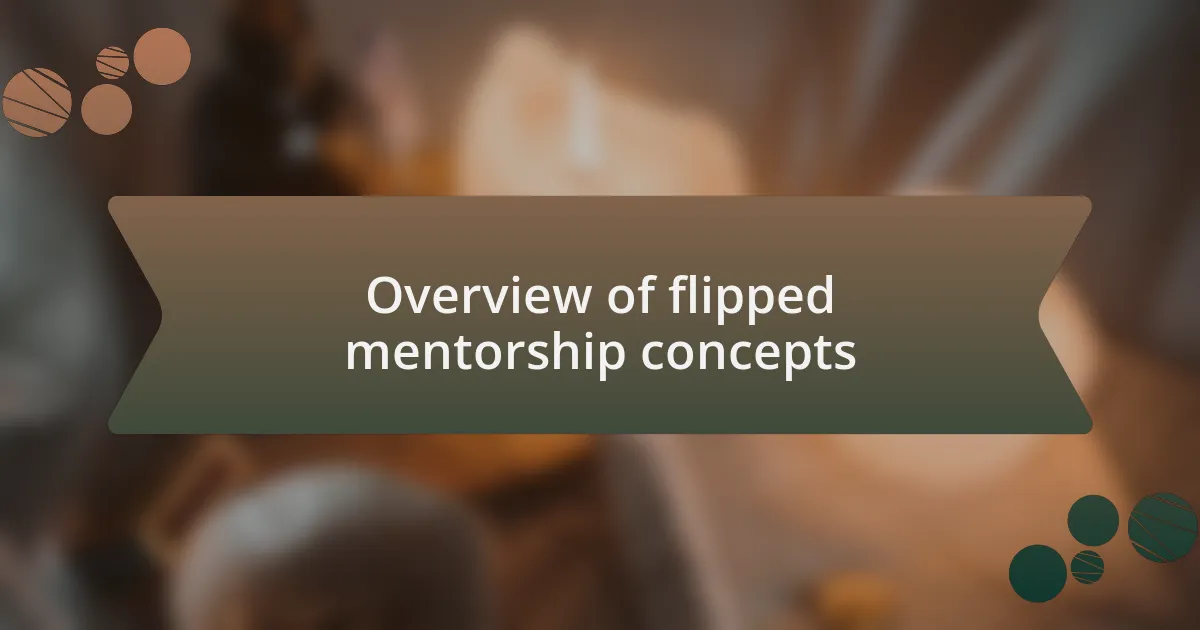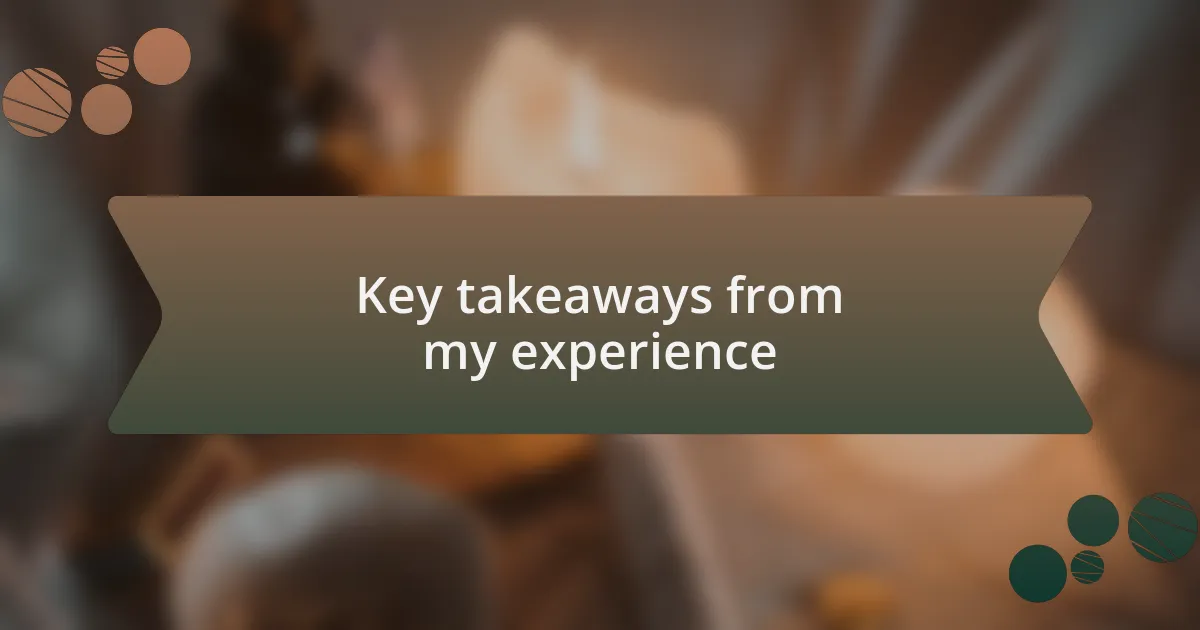Key takeaways:
- Flipped mentorship encourages mutual learning, allowing both mentors and mentees to gain new insights and perspectives.
- This approach fosters a culture of vulnerability, enabling open discussions about challenges that enrich the learning experience.
- Flexibility in discussions can lead to unexpected yet valuable insights, transforming conversations into deeper learning opportunities.

Understanding flipped mentorship programs
Flipped mentorship programs turn traditional mentoring on its head, placing younger or less experienced individuals in the role of mentors. This dynamic has fascinated me as it encourages fresh perspectives while also giving newer professionals a chance to showcase their knowledge and skills. I remember my first experience with this setup; I was asked to mentor a seasoned professional, and it felt both exhilarating and daunting.
One key aspect of flipped mentorship is the emphasis on mutual learning. In my experience, both parties emerge with a broader understanding of their fields, offering a unique blend of insights and methodologies. Have you ever found yourself learning something unexpectedly valuable from someone you thought you were teaching? That was my revelation – I gained new approaches simply by helping someone navigate the digital tools they weren’t familiar with.
Additionally, these programs create a more inclusive environment, fostering collaboration across generational divides. I’ve witnessed firsthand how this approach can break down barriers, allowing dialogue that enriches both personal and professional growth. Isn’t it inspiring how a shift in roles can unlock untapped potential in individuals and organizations alike? In my case, this experience has reshaped my views on knowledge sharing and collaboration, reinforcing the notion that mentorship is indeed a two-way street.

Importance of mentorship in education
Mentorship plays a crucial role in education, serving as a bridge between experience and skill development. I recall a time when I mentored a student who initially struggled with research methodologies. As we worked together, I saw her confidence grow, but I also found myself re-evaluating my own teaching strategies. Have you ever realized that your mentee’s questions challenge your own understanding, prompting you to rethink your approach?
In my opinion, mentorship cultivates resilience and adaptability in learners. When combined with the dynamic nature of flipped mentorship programs, these qualities are amplified. I distinctly remember guiding a colleague through project management tools, only to discover that her unique perspective on collaboration turned our workflow into something considerably more effective. It’s fascinating how education isn’t just about knowledge transfer; it’s about creating a thriving community where learning is reciprocal.
Moreover, mentorship fosters a sense of belonging in educational environments. This emotional connection can be pivotal, especially for students navigating uncertain paths. I once had a mentee who felt isolated in a large university; through our conversations and support, we not only addressed academic challenges but helped him build connections, making the academic experience enriching. Have you considered how a single mentoring relationship can create a ripple effect, impacting an individual’s educational journey and beyond?

Overview of flipped mentorship concepts
Flipped mentorship is an innovative approach that reverses traditional roles, allowing individuals with less experience to lead mentorship relationships. This concept struck me during a program I participated in, where junior faculty members shared their fresh ideas on technology integration in education. It was a revelation to see how their insights not only inspired our team but also ignited a sense of empowerment among them. Have you ever found that the newest voices can bring a perspective that seasoned professionals might overlook?
This model encourages a two-way exchange of knowledge that benefits both mentors and mentees. I can vividly recall being amazed by a young student’s grasp of digital storytelling tools; she introduced me to resources I had never encountered. It made me question my reliance on certain methodologies and pushed me to explore more diverse strategies. Isn’t it intriguing how stepping back can often lead to greater learning opportunities for everyone involved?
One key aspect of flipped mentorship is fostering mutual growth. It creates an environment where vulnerability is acceptable, allowing both parties to share their challenges openly. I’ve seen this in action during workshops where participants were encouraged to bring challenges to the table. Each story shared built connection and trust, enriching our group dynamic and elevating every participant’s learning experience. Have you ever felt that a simple exchange of struggles could lead to profound moments of understanding? It’s these interactions that make flipped mentorship a transformative educational practice.

Key takeaways from my experience
One of the most significant takeaways from my experience with flipped mentorship is the sheer power of perspective. I remember a moment during a discussion where a junior colleague shared their approach to student engagement that was completely different from mine. It struck me how their fresh take, rooted in their recent experiences, opened my eyes to new possibilities. Have you ever realized that sometimes the best solutions come from the least expected sources?
Another insight I gained was the importance of fostering a culture of continuous learning. During one session, I was open about my struggles with adapting to new educational technologies. Instead of feeling vulnerable, I found that this honesty prompted others to share their own challenges. This shared experience created a supportive atmosphere that encouraged us all to learn from one another. Have you noticed how vulnerability can transform conversations into something more meaningful?
Lastly, I learned that flexibility is crucial in flipped mentorship. There were times when discussions took unexpected turns, and I soon realized that these moments often led to the most profound insights. I recall an instance where a chat about curriculum design shifted into an exploration of student mental health. It was surprising but ultimately enriching. How often do we limit discussions to what we think is on the agenda? Embracing the unplanned can lead to some of the richest learning experiences.